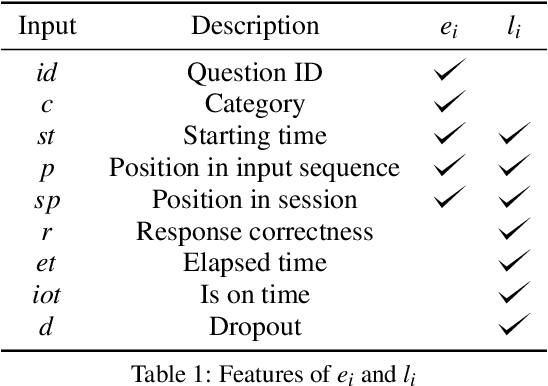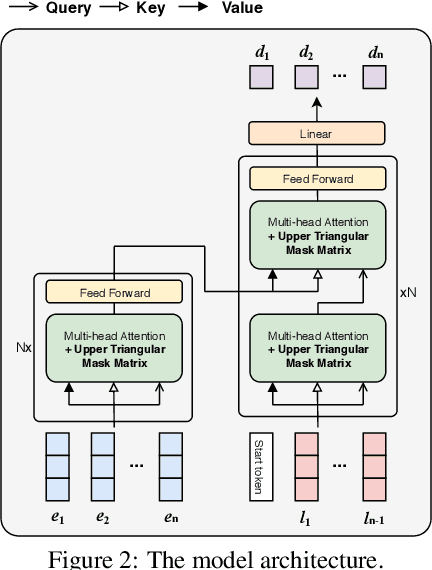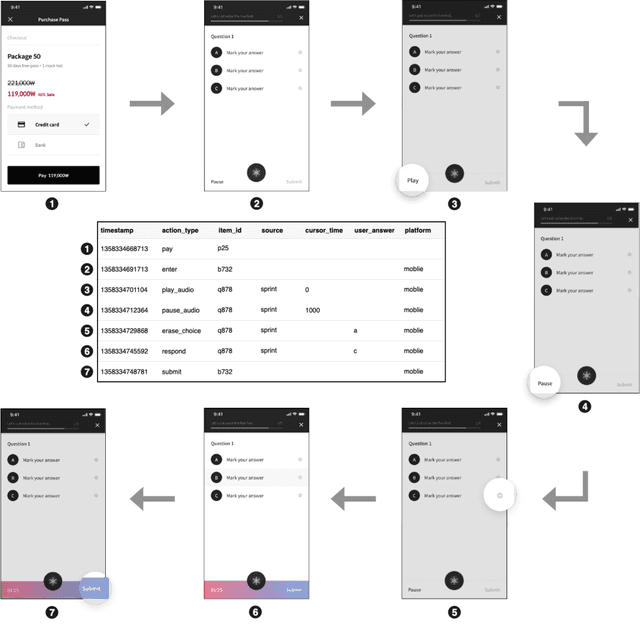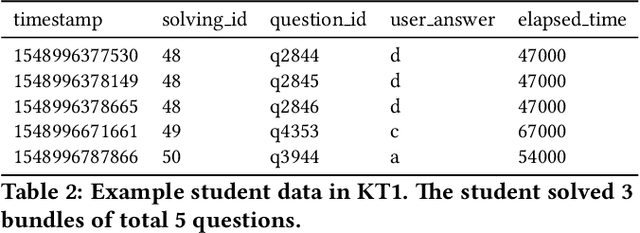Seoyon Park
Deep Attentive Study Session Dropout Prediction in Mobile Learning Environment
Feb 14, 2020



Abstract:Student dropout prediction provides an opportunity to improve student engagement, which maximizes the overall effectiveness of learning experiences. However, researches on student dropout were mainly conducted on school dropout or course dropout, and study session dropout in a mobile learning environment has not been considered thoroughly. In this paper, we investigate the study session dropout prediction problem in a mobile learning environment. First, we define the concept of the study session, study session dropout and study session dropout prediction task in a mobile learning environment. Based on the definitions, we propose a novel Transformer based model for predicting study session dropout, DAS: Deep Attentive Study Session Dropout Prediction in Mobile Learning Environment. DAS has an encoder-decoder structure which is composed of stacked multi-head attention and point-wise feed-forward networks. The deep attentive computations in DAS are capable of capturing complex relations among dynamic student interactions. To the best of our knowledge, this is the first attempt to investigate study session dropout in a mobile learning environment. Empirical evaluations on a large-scale dataset show that DAS achieves the best performance with a significant improvement in area under the receiver operating characteristic curve compared to baseline models.
EdNet: A Large-Scale Hierarchical Dataset in Education
Dec 06, 2019



Abstract:With advances in Artificial Intelligence in Education (AIEd) and the ever-growing scale of Interactive Educational Systems (IESs), data-driven approach has become a common recipe for various tasks such as knowledge tracing and learning path recommendation. Unfortunately, collecting real students' interaction data is often challenging, which results in the lack of public large-scale benchmark dataset reflecting a wide variety of student behaviors in modern IESs. Although several datasets, such as ASSISTments, Junyi Academy, Synthetic and STATICS, are publicly available and widely used, they are not large enough to leverage the full potential of state-of-the-art data-driven models and limits the recorded behaviors to question-solving activities. To this end, we introduce EdNet, a large-scale hierarchical dataset of diverse student activities collected by Santa, a multi-platform self-study solution equipped with artificial intelligence tutoring system. EdNet contains 131,441,538 interactions from 784,309 students collected over more than 2 years, which is the largest among the ITS datasets released to the public so far. Unlike existing datasets, EdNet provides a wide variety of student actions ranging from question-solving to lecture consumption and item purchasing. Also, EdNet has a hierarchical structure where the student actions are divided into 4 different levels of abstractions. The features of EdNet are domain-agnostic, allowing EdNet to be extended to different domains easily. The dataset is publicly released under Creative Commons Attribution-NonCommercial 4.0 International license for research purposes. We plan to host challenges in multiple AIEd tasks with EdNet to provide a common ground for the fair comparison between different state of the art models and encourage the development of practical and effective methods.
 Add to Chrome
Add to Chrome Add to Firefox
Add to Firefox Add to Edge
Add to Edge